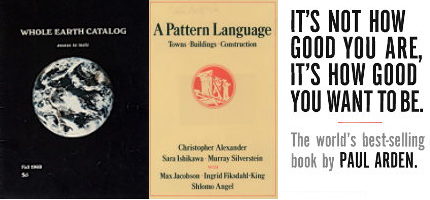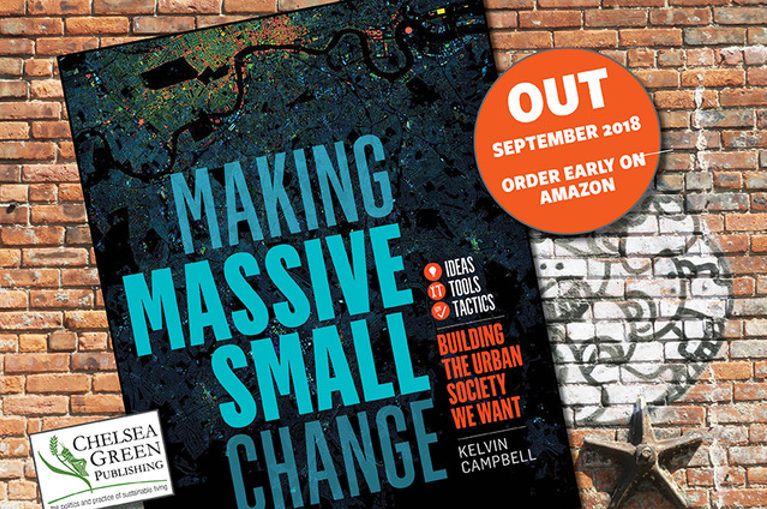 Editorial Note: The following is an excerpt from Making Massive Small Change: A Compendium of Ideas, Tools, and Tactics to Build Viable Urban Neighborhoods, by Kelvin Campbell and published by Chelsea Green.
Editorial Note: The following is an excerpt from Making Massive Small Change: A Compendium of Ideas, Tools, and Tactics to Build Viable Urban Neighborhoods, by Kelvin Campbell and published by Chelsea Green.
The Massive Small compendium is a sourcebook of ideas, tools and tactics to help build viable urban neighbourhoods; it works in tandem with our online information-sharing platform:
As a bold and ambitious project aimed at ‘changing hearts and minds’, it has many sides to it:
It is a compilation of KNOWLEDGE and WISDOM on a complex matter that affects all of us, pointing to many sources of information on the subject and backed up with relevant CASE STUDIES. It is a starting point, providing the prompts, potentials and examples to show how governments and people can work together to make Massive Small change. The examples are here to give proof of concept only; not to be blindly followed. Each place has to find its own way. It is not an academic tome—it does not set out to predict the outcome of a declared hypothesis and provide endless justifications of its truth—so it is always open to challenge. It is a new beginning, not an end.
It is based on the emerging science of COMPLEXITY, which is more concerned with how we start, how we learn from starting, and how we evolve to a better place—so it is about organising complexity. It is about SYSTEMS THINKING, and systems change—so it shows how this can happen. It borrows from many places, so it is not original—its originality lies in how it is assembled. It recognises that people will search Google to find its quotes and sources—so it does not slavishly reference every point.
It shows how governments can put their effort into shaping the earliest stages of the development process and sow the seeds for people (in all sectors) to grow their own environments. This means that the role of governments is to provide the ENABLING MECHANISMS for this growth and change to happen—by organising complexity. Here people play an influencing role in the process, providing informed feedback and responding to small changes made. We call these enabling mechanisms our ‘starter conditions’.
It is a practical, rigorous and progressive USER MANUAL to show how these starter conditions can be applied in all likely circumstances. It offers a set of tools that act at the interface of each of the starter conditions, showing how these conditions can be effectively implemented, managed and reviewed over time. It is supported by a collection of ESSAYS, gleaned from our online blogs and articles. Our online platform provides the means of updating information and evolving the Massive Small project.
It demonstrates how Massive Small principles can be applied in an imaginary urban neighbourhood, LOCALIA, taking us through the STARTER CONDITIONS, step by step, to shape the built environment and allow incoming citizens to form their own neighbourhood.
It is also a compilation of INSPIRATIONAL STORIES that elucidate and expand on the narrative of the theory. These stories, based on those in The Radical Incrementalist, are told through the eyes of imaginary citizens from different parts of the world. They show governments and people successfully working together to make amazing things happen that none could have achieved alone. The stories are fiction, based on reality. Woven into imaginary plots are the narratives of some real people with real projects in actual places. They could be anywhere. These stories are not proof of concept, just an illustration of the ‘sense of the possible’. Real proof of concept lies in over 300 generations of neighbourhood building that happened before we created the current system.
It concludes with how effective SYSTEM CHANGE can be initiated and accelerated by changing our ideas, tools and tactics at the national level through to metropolitan, city and town levels and down to the neighbourhood level. It gives us many clues as to how we can get back onto this path of EVOLUTION by harnessing the potentials and conflicts that exist between our bottom-up and top-down systems and build a better urban society worldwide.

Above: These three ground-breaking books provide the inspiration for this compendium. They are all of their time but made a significant impact in communicating complex ideas in simple ways.





